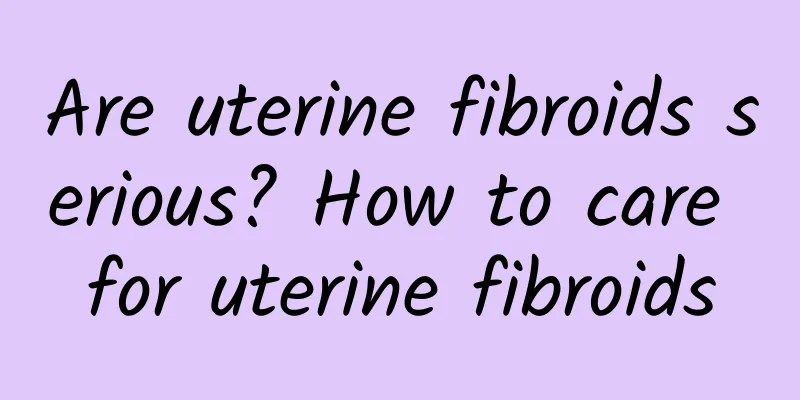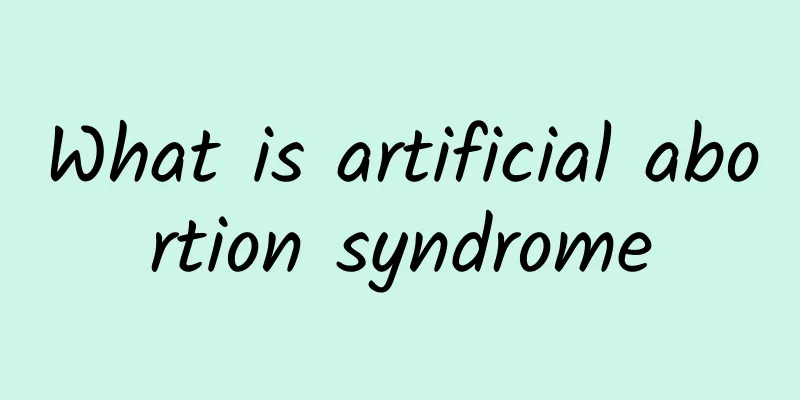Are uterine fibroids serious? How to care for uterine fibroids

|
Uterine fibroids are a benign tumor. Patients with uterine fibroids should first consider how to "coexist" with the disease while ensuring the quality of life. Most women diagnosed with uterine fibroids have neither symptoms nor surgery. However, some patients with uterine fibroids will have anemia or compression symptoms, making it difficult to ensure a normal life, not to mention "coexistence" with uterine fibroids. In this case, surgical treatment should be considered. Traditional Chinese medicine also has certain advantages in the treatment of uterine fibroids, and patients can make a comprehensive choice. List of five symptoms of uterine fibroids Generally speaking, uterine fibroids have no obvious symptoms (or are asymptomatic) in the early stages, and only to a certain extent can they be felt from physical changes. There are the following five symptoms. 1. Excessive leucorrhea Almost all gynecological diseases are related to excessive leucorrhea, and so is uterine fibroids, because it can cause pelvic congestion and infection, which then leads to increased vaginal flow, mixed with traditional leucorrhea to increase secretion. At this time, most leucorrhea is purulent and accompanied by a fishy smell. 2. Dysmenorrhea Uterine fibroids can compress nerves, stimulate uterine contractions, and are easily complicated by endometriosis. Therefore, women with uterine fibroids will most likely experience dysmenorrhea. 3. Excessive menstrual bleeding This symptom mainly occurs during the growth of uterine fibroids. As the fibroids continue to grow, the volume of the uterus will also increase accordingly, thus disrupting the normal physiological function of the uterus. Because the growth of the tumor affects the hemostatic function of the uterus during menstruation, patients with uterine fibroids often suffer from excessive menstrual bleeding, irregular bleeding, prolonged (or shortened) menstruation, and other diseases. 4. Lower abdominal mass During the growth of uterine fibroids, patients can feel the mass by themselves, especially in the morning before urinating, because the bladder is full and the uterus moves upward, making it easier to touch the fibroids. This feeling becomes more obvious as the fibroids grow. 5. Sense of oppression As uterine fibroids grow larger, they will inevitably compress the bladder, rectum, and peripheral nerves. Therefore, patients will experience symptoms such as lumbar pain, constipation, and frequent urination. Although this method is simple, some gynecological diseases have similar symptoms, so it is easy to confuse, and observation of symptoms cannot be used as the main preventive measure. How to pay attention to the care of uterine fibroids? Uterine fibroids are mainly a disease that occurs in the uterus. Uterine fibroids refer to uterine tumors. So, how can we take good care of uterine fibroids in our daily life? Next, let's learn from the following article. 1. Patients with uterine fibroids should prevent excessive fatigue and pay special attention to rest during menstruation. This is one of the nursing measures for uterine fibroids. 2. Regarding the care of uterine fibroids, we must pay attention to eating more vegetables and fruits, and patients with uterine fibroids should eat less spicy food. 3. Patients with uterine fibroids should keep their vulva clean and dry, and their underwear should be loose. If there is too much leucorrhea, they should pay attention to cleaning the vulva at any time. 4. After being diagnosed with uterine fibroids, you should go to the hospital for monthly check-ups. If the fibroids grow slowly or not at all, you can have a check-up every six months; if they grow significantly, you should consider surgical treatment to avoid severe bleeding or compression of abdominal organs. 5. Avoiding pregnancy again is an indispensable part of uterine fibroid care. Patients with uterine fibroids have poor uterine recovery after miscarriage, which often causes long-term bleeding or chronic genital inflammation. This is also very important in the care of uterine fibroids. |
<<: How big is a uterine fibroid? What are the dangers of uterine fibroids?
>>: Is it serious to have uterine fibroids? Will uterine fibroids affect pregnancy?
Recommend
Autumn of appetite! Eat grapes with the skin to maintain beauty and lose weight
The weather is getting cooler, and your appetite ...
There are many symptoms of Trichomonas vaginitis in the vagina
There are many symptoms of trichomoniasis in the ...
What yoga moves can I do for uterine adenomyosis? What surgery is best for uterine adenomyosis?
Uterine adenomyosis is a common gynecological dis...
Detailed introduction to the examination items for cervical hypertrophy
The incidence of cervical hypertrophy has been ve...
Sitting or standing for long periods of time is as deadly a cause of obesity as smoking, eating betel nuts, and drinking alcohol
Studies have confirmed that sitting or standing f...
Can endometriosis cause infertility?
Can endometriosis cause infertility? Endometriosi...
How to treat female cervical erosion? Physical treatment methods for female cervical erosion
Can cervical erosion be cured? Many women are alr...
If your period is always late, try these ingredients to relieve delayed menstruation
How to take care of yourself when your period com...
Eat Zongzi without the Zongzi during the Dragon Boat Festival! Low in salt, low in fat, high in fiber… 5 tips for eating zongzi healthily
The Dragon Boat Festival is coming, and rice dump...
Analysis of the hazards of endometrial tuberculosis
Endometrial tuberculosis is one of the common gyn...
Can uterine fibroids cause miscarriage?
Can uterine fibroids cause miscarriage? Uterine f...
What are the causes of uterine fibroids? The causes of uterine fibroids are related to these things
The causes of uterine fibroids are still unclear,...
The consequences of improper treatment of pelvic inflammatory disease
Women who suffer from pelvic inflammatory disease...
What are the people who are prone to cervical erosion?
In recent years, the number of patients suffering...
Just breathe properly and you will be healthy and slim
Slow exercise weight loss switch: breathing train...









